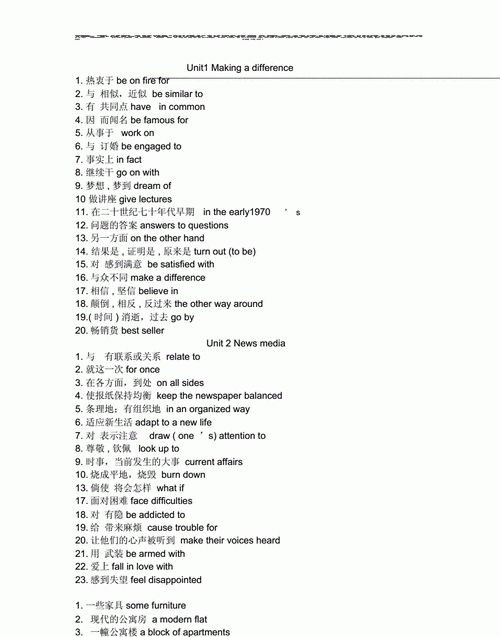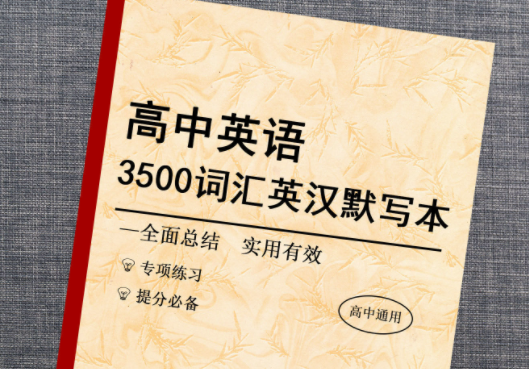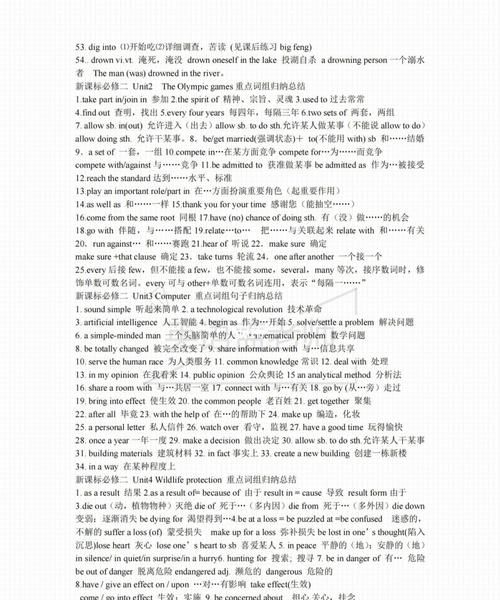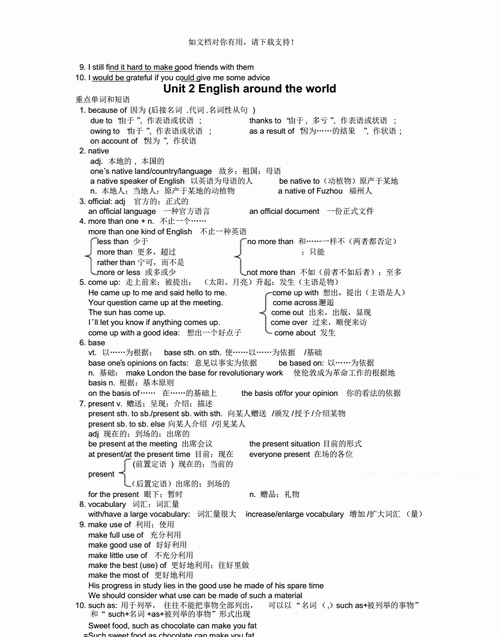本文目录
高中英语常用短语及句型归纳
我们读到高中之后,其英语课本里有哪些常用的 英语 短语 学过了呢?下面是我给大家带来高中英语必备短语,供大家参阅!
高中常用英语短语
1. in other words 换句话说,也就是说
2. in place of 代替
3. in poor health 身体不好
4. in public 当众,公开地
5. in rags 穿着破衣服
6. in search of 寻找,追求
7. in sight 在视野内,看得见
8. in someone’s/something’s favour 对„有利
9. in space 在空间
10. in surprise 惊奇地
11. in the day 在白天
12. in the daytime 在白天
13. in the distance 在远处
14. in the distant future 在久远的将来
15. in the end 最后;终于
16. in the face of 面对„而不顾
17. in the front of „ 在„的前部
18. in the future 在将来
19. in the hope of sth 希望„
20. in the near future 在不久的将来
21. in those days 在过去,在那些日子里
22. in time 及时,最终,迟早
23. instead of 代替;而不是
24. join in 参加
25. join the army 参军
高中必背英语短语
1. join up 连接起来
2. join„to„ 把„和„连接起来
3. jump off 跳下
4. jump onto 跳到„上
5. just a minute 等一会儿
6. just now 刚才;不久以前
7. just then 正在那时
8. keep (on) doing 继续;反复不断地做某事
9. keep „out of„ 使„不进入„
10. keep a certain distance 保持一定距离
11. keep a record (of sth.) 作记录
12. keep back 扣留
13. keep fit 保持身体健康
14. keep in touch with 与„„保持距离
15. keep off 让开;不接近
16. keep one’s balance 保持平衡
17. keep one’s promise 遵守诺言
18. keep one’s word 守约;守信
19. keep sb doing sth 让某人不停地做某事
20. keep silence/silent 保持安静
21. keep up with 跟上
22. keep up 保持;维持;继续
23. keep watch 守望,值班
24. keep„alive 存活
25. keep„away from„ 使远离„„
高中必备英语短语
1. how much 多少
2. how often 多久
3. how old 多大
4. how soon 多久以后
5. human being 人
6. hurry up 赶紧;急忙
7. in a hurry 匆忙地
8. in a minute 不一会儿,立刻
9. in a short while 不久
10. in a word 总之,简言之
11. in all 总计,全部
12. in common 共同
13. in danger 处于危险状态
14. in English 用英语
15. in fact 实际上
16. in favour of 支持,赞同
17. in fear of 在„恐惧中
18. in front of „ 在„的前面
19. in fun 开玩笑似的
20. in future 今后
21. in good health 身体健康
22. in half 一半
23. in need of 需要
24. in order 按顺序,井然有序
25. in order that/to 为了

高中英语短语归纳总结按字母顺序
高中英语短语归纳总结:
一、高中常用英语短语:
1. sooner or later或早或晚。
2. sound lab语音室。
3. sound like听起来象。
4. sound the fire alarm鸣响火警警报。
5. spare sb. some time为某人匀点儿时间。
6. spare time匀出时间。
7. speak out大胆地说出。
8. spend„on sth.在某物/事上花(时间,金钱)。
9. spend„(in) doing sth.在某物/事上花(时间,金钱)。
10. spoken English英语口语。
11. sports meet运动会。
12. stand at a attention立正。
13. stand by站在旁边,和„站在一起。
14. stand for代表。
15. stare at盯着。
16. start all over again重新开始。
17. start doing/to do sth开始做某事。
18. starve to death饿死。
19. stay away from远离。
20. stay up挺立,熬夜。
21. step by step逐步地,一步一步地。
22. step forward站出来。
23. sth be familiar to sb某物对某人是熟悉的。
24. stick to坚持。
25. stone by stone一块石头一块石头地。

二、高中必背英语短语:
1. stop doing sth停止做某事。
2. stop sb. (from ) doing防止某人做某事。
3. stop to do sth停下来去做某事。
4. strike a match划一根火柴。
5. struggle against为反对„而斗争。
6. struggle for为争取„而斗争。
7. struggle to one’s feet费力地站起来。
8. succeed in doing成功地做某事。
9. such as例如。
10. suffer fever发烧。
11. suffer from遭受。
12. suit„to„适合。
13. supply sb. with sth.给某人提供。
14. supply sth. to sb.给某人提供。
15. take (a) pride in以„而自豪。
16. take (a) pride in以„为骄傲。
17. take„for example拿„举例。
18. take„nationality加入„国籍。
19. take a„degree获得„学位。
20. take a deep breath深呼吸。
21. take a false name冒名。
22. take a look at„看一看。
23. take a photograph (of)照相。
24. take a taxi乘出租车。
25. take a taxi home乘出租回家。
高中英语重点知识笔记归纳
高中英语知识归纳
一.重点短语
1.face the music 面对命运对你的不公平
2.absorb…into 吸收,理解接受,吞并
be absorbed in全神贯注于, 专心致志于
be lost in thought想得出神 沉思于…
be engaged in 从事于…忙于
be concentrated on 集中注意力…
3.make a suggestion
give an advice
make the investigation
4.look into 调查 看 浏览
5.slow down 减缓
6.relate to 有关 涉及
7.link to 有关联系
8.die out 灭绝;die of 死于;die from死于
9.his career came to an end. 他的事业结束了。
10.develop a severe illness 染上很严重的疾病
高中英语知识要点
1. on holiday 在度假,在休假中
When I was on holiday, I visited my uncle. 我在度假的时候去看望了叔叔。
2. travel agency旅行社
=travel bureau
3. take off
1)脱下(衣服等), 解(除)掉
He took off his wet shoes.他脱下了湿鞋子。
2)(飞机)起飞
The plane took off on time. It was a smooth take-off.飞机准时起飞。起飞非常顺利。
3)匆匆离开
The six men got into the car and took off for the park.这六个人上了车,匆匆离开去公园。
4. go wrong v. 走错路, 误入岐途, (机器等)发生故障
5. in all adv. 总共
6. stay away v.外出
7. look up 查询(如宾语为代词,则代词放中间)
Look up the word in the dictionary.在字典里查单词。
相关词组:look for 寻找;look after照顾,照料; look forward to期待;look into调查; look on旁观;look out注意;look out for注意,留心,提防;look over翻阅,查看,检查;look around环视;look through翻阅,查看。
8. run after追逐,追求
If you run after two hares, you will catch neither.同时追两只兔子,你一只也抓不到。
9. on the air广播
We will be on the air in five minutes.我们五分钟以后开始广播。
This programme comes on the air at the same time every day.这个节目每天在同一时间播出。
高中英语语法知识点
一、主语
主语是句子陈述的对象,说明是谁或什么。表示句子说的是"什么人"、“什么事”、“什么东西”、“什么地方”等等。
名词、代词、数词、动名词、To do不定式、一个句子 都可以做主语。
二、谓语
谓语是对主语动作或状态的陈述或说明,指出“做什么”、“是什么”或“怎么样”. 谓语动词的位置一般在主语之后。
三、宾语
宾语,又称受词,是指一个动作(动词)的接受者。宾语分为直接宾语和间接宾语(间接宾语也称宾语补足语)两大类,其中直接宾语指动作的直接对象,间接宾语说明动作的非直接,但受动作影响的对象。一般而言,及物动词后面最少要有一个宾语,而该宾语通常为直接宾语,有些及物动词要求两个宾语,则这两个宾语通常一个为直接宾语,另一个为间接宾语。名词、代词、数词、动名词、To do不定式、一个句子 都可以做宾语,而to do不定式用于宾语补足语。
四、定语
定语是用来修饰、限定、说明名词或代词的品质与特征的。 主要有形容词此外还有名词、代词、数词、介词短语、动词不定式(短语)、分词、定语从句或相当于形容词的词、短语或句子都可以作定语。 汉语中常用„……的‟表示。定语和中心语之间是修饰和被修饰、限制和被限制的关系。在汉语中,中心语与定语二者之间有的需要用结构助词“的”,有的不需要,有的可要可不要。 “的”是定语的标志。
高中英语必备知识点
1. 将来进行时的句型结构
will/shall + be + 现在分词
shall用于第一人称I和we,will可用于各人称。而在美式英语中所有人称都用will。
2. 将来进行时的用法
(1). 表示在将来某一时间段内正在进行的动作。常与at 7 o’clock tonight, next year, by this time tomorrow等时间状语连用。有时没有明确的时间状语。
e. g. I will be studying in America next year. 我明年将在美国学习。
By this time tomorrow, I will be lying on the beach. 明天这个时间,我会正躺在沙滩上。
We shall be working in a big modern office building.
我们将在一个很大的现代化办公楼里工作。
(2) 表已经决定或安排好要发生的动作或事情。
e. g. We shall be meeting in Carrifour at 6 o’clock this afternoon.
我们定于今天下午六点在家乐福见面。
Tom will be seeing his friend off at the airport tomorrow.
汤姆明天将于机场为他的朋友送行。
(3) 预测将来会发生的事情,表将来的某种可能性。
e. g. If we keep working hard like this, we will be making a miracle.
如果我们继续这样努力工作的话,我们会创造奇迹的。
(4) 将来进行时除表示未来以外,还可表示亲切或委婉的语气。
e. g. I shall be thinking of you. 我会想你的。
Will you be staying here long? 你会在长时间呆这儿吗?
辨析:现在进行时/将来进行时
两者都可以用来表将来的动作。但现在进行时通常用于表示不远的将来的动作,而且有确
定的时间,而将来进行时则可以和确定的时间状语连用,也可以不用,既可以表示不远的将来的动作,也可以表示较远的将来的动作。
e. g. We are meeting him tomorrow/ We will be meeting him tomorrow.我们明天将会见到他。
We will be meeting him next year. 我们明年将会见到他。(注意此句不可用进行时,因为明年是较远的将来时间)
高中英语知识总结
一、every与each的区别。
every
1)可单独使用 1)不可单独使用2)可做代名词、形容词
1)个人或物 2)仅作形容词3)着重“个别”3)着重“全体”,毫无例外4)用于两者或两者以上中的每一4)用于三者或三者以上每一个人或物 The teacher gave a toy to each child. Each ball has a different colour.
当我们说each child, each student或each teacher时,我们想到的是一个人的情况。而当我们说every child和every student时,我们想到的是全体的情况,every的意思与all接近,表示他们都如此。 Every student loves the English teacher. = All students love the English teacher.
Every child likes playing. = All children like playing.
二、all和both的用法。
①all指三者以上,或不可数的东西。谓语动词既可以用单数,也可以用作复数。在句中作主语、表语、宾语、同位语和定语。
All of us like Mr Pope. 我们都喜欢Pope先生。(作主语) = We all like Mr Pope. (作同位语) All the water has been used up. (作主语)That's all for today. (作表语) Why not eat all (of) the fish? (作宾语) All the leaders are here. (作定语)
②both作代词。
a.与其他名词或代词并列出现,表示“两个都”。 Lucy and Lily both agree with us. They both passed on their sticks at the same time. How are your parents? They're both fine.
b.与“of +代词(或名词)”连用,表示“两者都”。 Both of them came to see Mary. Both of the books are very interesting.
c.单独使用,表示“两者(都)”。 Michael has two sons. Both are clever. I don't know which book is the better, I shall read both.
③both用作形容词,放在名词之前,修饰该名词,表示“两者都”。 Both his younger sisters are our classmates . There are tall trees on both sides of the street.
高中英语知识
一、在进行时
1.概念:表示现阶段或说话时正在进行的动作及行为。
2.时间状语:Now, at this time, days, etc. look. listen
3.基本结构:主语+be +doing +其它
4.否定形式:主语+be +not +doing+其它
5.一般疑问句:把be动词放于句首。
6.例句:How are you feeling today?你今天感觉如何?
He is doing well in his lessons.在课上他表现得很好。
二、 过去进行时
1.概念:表示过去某段时间或某一时刻正在发生或进行的行为或动作。
2.时间状语:at this time yesterday, at that time或以when引导的谓语动词是一般过去时的时间状语等。
3.基本结构 主语+was/were +doing +其它
4.否定形式:主语+was/were + not +doing+其它
5.一般疑问句:把was或were放于句首。(第一个字母大写)
6.例句:At that time she was working in a PLA unit.那段时间她在人民解放军部队工作。

高中英语重点知识点的归纳大全
高中英语重点知识点的归纳1
一、不及物动词
当open,close,shut,lock,move等用作不及物动词且表示主语的某种属性时,通常用主动形式表示被动意义: The door won’t shut.这门关不上。The supermarket doors shut automatically.超市的门是自动关的。
1、该用法的不及物动词通常与can’t,won’t等连用,注意它与用被动语态含义不同。
2、该用法通常与well,easily,slowly,quickly等副词连用,并且在用于以上意思时通常不宜直接使用被动语态形式。不过在某些特殊情况下也可用被动语态,只是含义稍有不同(用主动形式表示 主语的属性,用被动形式表示动作执行者所执行的动作)。
3、某些表示开始和结束的动词(begin,start,finish,end等),当主语为事物且不强调动作的执行者时,可用主动形式表示被动意义。
二、非谓语动词用主动表被动
(1)不定式to blame,to let用作表语时,通常要用主动形式表示被动意义
(2)某些“be+形容词+to do”结构中的不定式通常要用主动形式表示被动意义
①这类结构的特点是句子主语就是其后不定式的逻辑宾语,按理说其中的不定式要用被动形式,但习惯上却要用主动表被动。
②有时形容词后跟有名词,在名词后用作定语的不定式用主动形式表示被动意义。
③有少数用于类似结构的形容词(如fit,ready,free等),其中的不定式用主动式和被动式均可。
(3)不定式用于某些动词(如have,have got,get,want,need等)的宾语后作定语时,如果不定式的逻辑主语就是句子的主语,则要用主动形式表示被动意义
(4)不定式用于某些双宾动词(如give,show,buy,lend,get等)的直接宾语后作定语时,如果不定式的逻辑主语就是直接宾语前的间接宾语,通常用主动形式表示被动意义
(5)不定式用于修饰“there be+名词”中的名词时,可用主动式,也可用被动式,有时含义差不多
(6)be worth后的动名词要用主动表被动
(7)在need,want,require等少数表示“需要”的动词后的动名词用主动形式表被动意义
①以上结构中的动名词改用不定式则要用被动式表示被动意义
②它们后接名词时也可表示被动意义
高中英语重点知识点的归纳2
一. 过去分词作表语
作表语用的过去分词表示主语的特点或所处的状态,相当于形容词,强调主谓关系;被动语态表示动作,强调动宾关系,绝大多数被动结构中的行为执行者还可以用by短语来表示。
1. 过去分词做表语与被动语态的差异:
The store is now closed.(系表)
The library is usually closed at 8:00 p.m. (被动)
2. 某些过去分词作表语,多半用来表示人物所处的心理状态或情感变化, 其主语主要是人。
这类过去分词通常为下列过去分词: delighted, devoted, discouraged , astonished, frightened, excited, inspired, encouraged, interested, contented, pleased, puzzled, satisfied, tired, worried, ect .
二. 过去分词作定语
作定语的过去分词相当于形容词,其逻辑主语就是它所修饰的名词。及物动词的过去分词作定语,既表被动又表完成;不及物动词的过去分词作定语,只表完成。
1. 过去分词用作定语,如果是单个的,置于其所修饰的名词之前。
We must adapt our thinking to the changed conditions.
我们必须使我们的思想适应改变了的情况。
2. 过去分词短语用作定语时,置于其所修饰的名词之后,其意义相当于一个定语从句,但较从句简洁,多用于书面语中。
The concert given by their friends was a success.
他们朋友举行的音乐会大为成功。
3. 过去分词短语有时也可用作非限制性定语,前后常有逗号。
The meeting,attended by over five thousand people,welcomed the great hero.
他们举行了欢迎英雄的大会,到会的有五千多人。
高中英语重点知识点的归纳3
1. 现在完成进行时的定义
现在完成进行时表示某动作从过去某个时间开始,一直延续到现在,并且还有可能持续下去。如:
We have been waiting for him for two hours.
2. 现在完成进行时的结构
have /has been + doing
3. 现在完成进行时的应用
现在完成进行时所用的时间状语:
this month / week / year, these days, recently / lately,
in the past few + 时间段, since +时间点, for + 时间段。如:
They have been building the bridge for two months.
They have been planting trees this month.
(一)表示动作的延续
The Chinese have been making paper for two thousand years.
中国有2000年的造纸历史。(动作还将继续下去)
I have been learning English since three years ago.自从三年前以来我一直在学英语。
(二)表示在说话时刻之前刚刚结束的动作。
We have been waiting for you for half an hour.
我们已经等你半个钟头了。(动作不再继续下去)
(三)有些现在完成进行时的句子等同于现在完成时的句子。
They have been living in this city for ten years.
They have lived in this city for ten years.
他们在这个城市已经住了10年了。
I have been working here for five years.
I have worked here for five years.
我在这里已经工作两年了。
(四)大多数现在完成进行时的句子不等同于现在完成时的句子。
I have been writing a book.(动作还将继续下去)
我一直在写一本书。
I have written a book.(动作已经完成)
我已经写了一本书。
They have been building a bridge.
他们一直在造一座桥。
They have built a bridge.
他们造了一座桥。
(五)表示状态的动词不能用于现在完成进行时。
I have known him for years.
我认识他已经好几年了。
×I have been knowing...
这类不能用于现在完成进行时的动词还有:love爱,like喜欢,hate讨厌,等。
4. 现在完成进行时与现在完成时的区别
(1) 现在完成时强调动作的完成,而现在完成进行时强调动作的延续,因此,表示动作的完成,只能用现在完成时,而不能用现在完成进行时。如:
He has changed his idea.
(2) 在表示动作的延续时,虽然既可用现在完成时,也可用现在完成进行时,但现在完成进行时强调动作的进行。因此在需要明确表示动作还要持续下去时,应用现在完成进行时。如:
We have been studying here for two years.
(3) 有些延续性动词(如 keep, learn, live, stay, study, work等),用于现在完成时或现在完成进行时的区别不大。如:
I have lived here for many years.
=I have been living here for many years.
我在这儿住了多年了。
高中英语重点知识点的归纳4
1.able 用法:be able to do
Note: 反义词unable表示不能,而disabled表示残疾的。
be able to do可以表示经过艰难困苦才能做到的事。
2.abroad 用法:表示到(在)国外,是一个副词,前面不加介词。
Note: 可以说from abroad, 表示从国外回来。
3.admit 用法:表示承认的时候后面要加上动名词形式。
Note: 表示允许进入的时候与介词to搭配。
4.advise 用法:advise sb. to do; advise doing
Note: 后面的宾语从句要用虚拟语气。即:advise that sb. (should) do的形式。
5.afford 用法:通常与动词不定式搭配使用。
Note: 前面需要有be able to或can等词。
6.after 用法:表示在时间、空间之后;be after表示追寻。
Note: 用在将来时的时候后面接一时间点,而in接一个时间段,如:after 3 o’clock; in 3 days.
7.agree 用法:与介词on, to, with及动词不定式搭配。
Note: agree on表示达成一致;agree to表示批准;agree with表示同意某人说的话。
8.alive 用法:表语性形容词,在句中只能作表语,不能作定语。
Note: 可以作状语使用,表示活活地,如:bury sb. 高中生物 alive.
9.allow 用法:allow doing; allow sb. to do
Note: 可以表示允许进入,如:Please allow me in.
10.among 用法:用在三者或三者以上的群体中。
Note: 还可以表示其中之一,如:He is among the best.
11.and 用法:用于连接两个词、短语、句子或其他相同结构。
Note: 与祈使句搭配时往往可以表示条件。如:Work hard, and you’ll succeed sooner or later.
12.another 用法:表示又一个,泛指,相当于one more的.含义。
Note: 不能直接加复数名词,需要与一个数词搭配,如:another 2 weeks.
13.answer 用法:及物动词,但在作名词时要与介词to搭配。
Note: 可以表示接电话、应门等。如:answer the phone/door.
14.anxious 用法:be anxious for/about/to do
Note: be anxious about表示担心;be anxious for表示盼望得到。
15.appear 用法:不及物动词,没有宾语,没有被动语态。
Note: 还可以作为系动词,与seem同义,表示看起来……。
16.arrive 用法:arrive at表示到一个小地方;arrive in表示到一个大地方。
Note: 引申含义表示得出,如:arrive at a decision/conclusion.
17.ask 用法:ask to do; ask sb. to do; ask for
Note: 后面的宾语从句要用虚拟语气。即:ask that sb. (should) do的形式。
18.asleep 用法:表语性形容词,在句中只能作表语,不能作定语。
Note: 通常与动词be及fall搭配;sound asleep表示熟睡。
19.attend 用法:表示参加,后面经常加上meeting, lecture, conference, class, school, wedding, funeral等词;也可以表示照顾,照料。
Note: attend to可以表示处理、照料等。
20.attention 用法:pay attention to; draw/catch sb’s attention
Note: 写通知时的常用语:May I have your attention, please?
21.beat 用法:表示打败某人,或连续不断地击打某物。
Note: heartbeat表示心跳。
高中英语重点知识点的归纳5
1.同位语从句:同位语从句在句中作A同位语,对被修饰名词的内容予以解释说明。同位语的特点是:抽象名词在前,表达具体内容的从句在后。
常见的名词包括: assumption假定/belief看法/ conclusion结论/ doubt怀疑等。 例句:The suggestion that we should develop the natural resources in the region has been discussed. 关于我们应该开发本地区资源的建议已经讨论过了。
2.现在完成时:表示过去延续到现在的动作或状态。具体来说,这种用法是表示开始于过去的动作一直持续到现在,而且还可能继续持续下去。谓语动词一般为延续性动词。
例句:An old woman walked out into the middle of the street. The policeman yelled to her, “Don’t you know what it means when I hold up my hand?” The lady said, “Sure I do. I have been a schoolteacher for 28 years now.” 一个老妇人走到了马路中央,这时,一位交警朝着她嚷道:“我都把手举起来了,你难道还不知道什么意思吗?”老太太说:“我当然知道,我都做了28 年的老师了。”
3. 时间状从:not…until… 用法。例句:The students didn’t stop talking until the teacher came in.
4. it做形式主语,句子做逻辑主语:如果主语太长,常用代词 it 作形式主语,将真正的主语从句置于句尾,以保持句式的平衡。
例句:It makes no difference what you read or study if you can’t remember it. 如果你记不住,那么你读什么或者学什么都不重要了。
5. 现在分词短语作状语:
(1)现在分词作时间状语。例句:There are several things to consider when buying fresh foods. 当购买新鲜食品时,有几个事情要考虑。
(2)现在分词作条件状语。例句:Working hard, you will succeed. 如果努力工作,你将会成功。
(3)现在分词作伴随状语。例句:All night long he lay awake, thinking of the problem. 他整夜躺在床上睡不着,思考着那个问题。
(4)现在分词作方式状语。例句:Please answer the question using another way. 请用另一种方法回答问题。
(5)现在分词作原因状语。例句:Not knowing her address, I can’t write to her.由于不知道她的地址,我没法给她写信。
(6)现在分词作结果状语。
例句:Possessing a car gives a much greater degree of mobility, enabling the driver to move around freely. 拥有汽车使机动程度更高,使司机能自由自在地往来各地。
(7)现在分词作让步状语。
例句:Although working from morning till night his father didn’t get enough food.虽然他父亲从早到晚拼命干,但是还是挣不够吃的。
高中英语重点知识点的归纳6
1. cultural relics 文化遗产
Many unearthed cultural relics were exhibited at the museum.
博物馆展出了许多出土文物。By definition the capital is the political and cultural center of a country. 根据定义,首都是一个国家的政治文化中心。
2. rare and valuable 珍贵稀有
3. in search of 寻找,寻求 = in search for
He went to the south in search for a better future.他为了寻找更好的前途到南方去。
4. in the fancy style 以别致的风格 in … style/ in the style of ……以……风格
These clothes are too fancy for me, I prefer plainer ones. 这些衣服对我来说有些花哨,我还是喜欢素净些的。
5. …a treasure decorated with gold and jewels, which took the country’s best artists about ten years to make. 用金银珠宝装饰起来的珍品,一批国家最优秀的艺术家用了大约十年的时间才把它完成。
decorate with 以...装饰
6. be designed for …为……而设计
by design 故意地
This room was originally designed to be my study. 这间屋子原预定做我的书房。
His parents designed him for the army, but he preferred the navy. 他父母打算要他当陆军,但是他却喜欢当海军。
7. belong to 属于
We belong to the same generation. 我们属于同代人。
8. in return 作为回报/报答/交换 in turn 依次地,轮流的;转而,反过来
9. serve as 作为,用作,充当,起作用
The room can serve as a study. 这间房子可作书房用。
10. Later,Catherine II had the Amber Room moved to a palace outside St Petersburg where she spent her summers. 后来,叶卡捷琳娜二世派人把琥珀屋搬到圣彼得堡郊外她避暑的宫殿中。
have sth done 请/让别人做某事,使得,蒙受某种损失
We had the machine repaired. 我们请人把机器修好了。
11. In 1770 the room was completed the way she wanted.
Police are combing the woods for the missing children.警察搜遍树林以寻找失踪的孩
12. be at war 处于战争状态,交战
13. remove some furture and small art objects 把一些家具和小件艺术品搬走
He removed the mud from his shoes. 他去掉鞋上的泥。
This old table is a valuable piece of furniture. 这张旧桌子是一件很珍贵的家具。
14. in less than two days 在不到两天的时间里
15. There is no doubt that the boxes were then put on a train for…There is no doubt that she will keep her word.毫无疑问她会遵守诺言的
There is no doubt that Taiwan belongs to China. 这是毫无疑问的,台湾属于中国。
.without doubt 无疑地,确实地
He is without doubt the cleverest student I've ever taught.
他确实是我所教过的学生中最聪明的
16. rather than 胜于,而不是
Tom rather than Jack is to blame. 该受责备的是汤姆,而不是杰克。
I prefer to read rather than sit idle. 我宁愿读书而不愿闲坐着。
We aim at quality rather than quantity. 我们的目的是重质不重量。
17. Nor do I think they should give it to any government. 我也不认为他们会把它交给任何政府。
18. do with 处理,忍受,对付
I can't do with his insolence. 我忍受不了他那傲慢无礼的态度
What do they do with the coin? 他们是怎样处理这枚硬币的?。
高中英语重点知识点的归纳7
1. when 引导的状语从句
(1)when可以和延续性动词连用,也可以和短暂性动词连用。
例句:Why do you want a new job when you’ve got such a good one already?(get为短暂性动词)你已经找到如此好的工作,为何还想再找新的?
when从句的谓语动词可以在主句谓语动作之前、之后或同时发生。
例句:When he had finished his homework,he took a short rest.(finished先发生)当他完成作业后,他休息了一会儿。
When I got to the airport,the guests had left.(got to后发生)当我赶到飞机场时,客人们已经离开了。
2. that 引导的宾语从句
名词从句作动词宾语时,前面的that常被省略,特别是在非正式语体中。
例句:I suggested (that) they should drive along the coast. 我建议他们沿着海岸开车。
I hoped (that) I would / should succeed. 我曾希望我会成功。
3. which 引导的主语从句。
例句:Which book they will choose is still unknown. 他们将选择哪本书仍然不被人知。
4.过去完成时和过去将来时
(1)过去完成时(past perfect tense):强调的是过去某一动作或状态发生在另一动作前或过去某个时间常常用到的时态,或指在过去某个时间段已经发生的事情,它就是过去的过去。 ①表示发生在过去的动作对现在造成的某种影响或结果,用来指定在另一个过去行动之前就已经完成了的一个事件。②过去某动作一直持续到现在将来可能还要延续下去。句中的动作发生在过去之前(过去的过去),即过去完成时动作发生在过去的过去。例句: He said he had been to Beijing twice. 他说他已经去过北京两次。
(2)过去将来时表示在过去某个时间看来将要发生的动作或存在的状态。即:过去将来时是“立足过去,着眼未来”的一种时态, 常用于宾语从句中。判断这种时态的依据是:要有表示过去的“动作”, 而不是时间。例句:I heard that they were going to return to Shanghai soon. 我听说他们不久要回到上海。
5. there be句型:表示的是 “某处有(存在)某人或某物”,其结构为There be (is,are,was, were )+名词+地点状语。例句:There are fifty-two students in our class. 教室里有52个学生。
高中英语重点知识点的归纳8
使用被动语态应注意的几个问题:
1.不及物动词无被动语态.
What will happen in 100 years.
The dinosaurs disappeared about 65 million years ago.
2.有些动词用主动形式表示被动意义.
This pen writes well.
This new book sells well.
3.感官动词或使役动词使用省略to的动词不定式,主动语态中不带to,但变为被动语态时,须加上to .例:make somebody do something→somebody+ be +made to do something
see somebody do something→somebody +be +seen to do something
A girl saw my wallet drop when she passed by.→My wallet was seen to drop by a girl when she passed by. The boss made the little boy do heavy work.→The little boy was made to do heavy work by the boss.
4.如果是接双宾语的动词改为被动语态时,直接宾语(物)作主语,那么动词后要用介词,这个介词是由与其搭配的动词决定.
He gave me a book.→A book was given to me by him.
He showed me a ticket.→A ticket was shown to me by him.
My father bought me a new bike. →A new bike was bought for me by my father.

以上就是关于高中英语重点短语总结归纳 ,高中英语常用短语及句型归纳的全部内容,以及高中英语重点短语总结归纳 的相关内容,希望能够帮到您。

